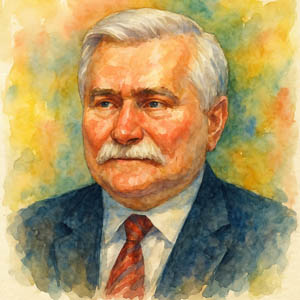— Lech Wałęsa
 Some people walk into history by choice. Others are pushed there by the tide of events and rise to meet it. Polish political leader Lech Wałęsa (1943–) was one of those rare souls who did both — stepping forward with courage while standing firm for his people.
Some people walk into history by choice. Others are pushed there by the tide of events and rise to meet it. Polish political leader Lech Wałęsa (1943–) was one of those rare souls who did both — stepping forward with courage while standing firm for his people.
Born on this day in the small village of Popowo, north of Warsaw, to hardworking peasant farmers, he attended trade school and worked as a shipyard electrician, where his moral compass and quiet determination drew him into union activism.
“Everyone wants a voice in human freedom. There’s a fire burning inside all of us,” he said. In 1980, Wałęsa and fellow workers founded Solidarity, a federation of Polish trade unions — the first independent, autonomous union in the Communist world. Within months, the movement faced severe repression. Martial law was declared, Wałęsa was briefly imprisoned, and by 1982 Solidarity was outlawed.
“Power is only important as an instrument for service to the powerless,” he maintained, devoting himself to dignity, individual rights, and freedom. “Words are plentiful, but deeds are precious.”
His steadfast spirit was recognized in 1983 when Wałęsa received the Nobel Peace Prize for advancing human rights through negotiation and peace. He dedicated the honor to Solidarity’s 10 million members, affirming, “We crave for justice, and that is why we are so persistent in the struggle for our right.”
The tide was turning across Eastern Europe. In 1989, Solidarity was legalized once more, playing a decisive role in ending communism. The following year, Wałęsa was elected President of Poland and served until 1995.
On freedom, he reflected, “Freedom may be the soul of humanity, but often you have to struggle to prove it.” A historical hero and enduring inspiration, Wałęsa has shown that courage is not a single act but a lifetime’s calling.
Even in his later years, through health battles and political storms, he continues to speak for justice with the same steady voice that once echoed across shipyards and city squares. His life reminds us that when we hold the line together, we become the strength that keeps the balance, and the hope, alive.
 Life is like walking a tightrope. Keep your balance. 🌟
Life is like walking a tightrope. Keep your balance. 🌟
